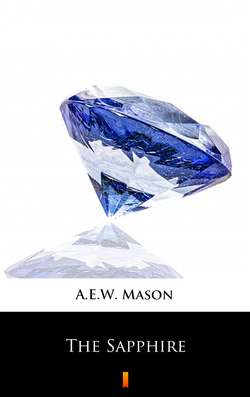Читать книгу The Sapphire - A.E.W. Mason - Страница 5
На сайте Литреса книга снята с продажи.
ОглавлениеCHAPTER II. THE PACKET
DURING the morning Captain Crowther stood beside his helmsman at the high wheel on the roof of the steamer. The Second Defile with its monstrous, high cliff, its racing waters, and the unmanageable great rafts of teak wood floating down to Rangoon presented always a delicate problem in navigation. But Captain Crowther certainly knew his business. He edged his steamer in here, thrust a raft aside there, and by lunch-time the hills had fallen back and we were thrashing down the broader waterway to Schwegu. At luncheon Crowther took the head of the table and I found that a place had been laid for me at his elbow. He was a man of thirty-six years or so, and he had the sort of hard, leering, and wicked face the early craftsmen were so fond of carving on the groins and pillars of French cathedrals. I took a dislike to him at my first glance.
“You are Mr. Martin Legatt of the Forest Corporation,” he said to me as I took my seat.
“Yes.”
“I am Michael D. Crowther, the Captain of the Dagonet”; and he spoke with so violent an American accent that I felt sure at once that he was an Englishman.
“Press the flesh,” said I, extending my hand, and equal, I hoped, to the occasion.
The stewards placed great basins of soup in front of each of us. There were eight passengers besides myself, so far as I remember. Michael Crowther consumed his soup with a little finger crooked from a suburban past and almost an excess of good breeding. When he had finished–and he deserved every drop of it for his skill in wriggling so quickly through the Second Defile–he said:
“A solitary life yours, Mr. Legatt. Gee, I don’t think that I could stick it for a week.”
I had all a young man’s inclination to make his ways look magnificent and unusual; and the presence of the eight tourists was a temptation to embroidery. But Captain Crowther was the last man in the world to whom I would have tried to explain the magic which forest life then held for me. So I answered with a show of indifference:
“There are compensations, Captain. I don’t suppose, for instance, that there is a single person on board who is feeling half the pleasure I am at this moment from simply stretching my legs out under a civilised dining-table with the knowledge that I have nothing to do all the afternoon except lounge in a long chair and watch the river-banks go by.”
“Well, each man to his taste,” Captain Crowther remarked. He was kind enough to look me over with approval. “I should have thought that a young fellow like you, however–why, holy snakes! I reckon you never came across a bird from one end of the month to the other.”
For a moment I was mystified, but the knowing wink with which Crowther supported his remark was a sufficiently explanatory footnote.
“Nary a bird,” I answered.
The tourists looked up intelligently. They were going to obtain information at first hand about the forests of Burma. Two ladies of middle age sat opposite to me–the two inevitable English ladies to be met with on any steamer and any train within the world’s circumference. One of them, the younger I suppose by a couple of years, said eagerly:
“Not a bird! Now isn’t that strange? Would you say that that was particularly Oriental?”
“My dear!” the friend chided her by the right of, say, her two years’ seniority. “After all, we have our birdless grove at Goodwood–or rather the Duke has his.”
She was standing up gallantly for her country. Privately she might think it was down and out, publicly you couldn’t beat it. Even if it came to a comparison of birdlessness, the gorgeous East had nothing on England. Wasn’t there the famous Grove?
The junior of the pair, however, objected to corrections at the dinner-table. She bridled and answered with a definite tartness.
“I have heard grave doubts thrown upon that story–” she began, but I thought it time to stop a rift which might in the end split a pleasant fellowship. I interrupted her.
“I am afraid that the birds of Captain Crowther’s vocabulary are not the birds which nest in trees.”
The ladies were puzzled; Captain Crowther was noisily delighted. He slapped the flat of his hand upon the table.
“That’s a good one! That’s a witticism, that is, Mr. Legatt!” He felt in his pockets. “I keep a little book to jot down the wise-cracks I hear. “Not the birds...’ ” And pulling out his book he wrote my poor little remark down, with a final stab of his pencil at the end which no doubt it deserved. “And not a pal to hobnob with over a glass of something?” he continued.
“A pal to hobnob with from time to time, yes, but not a glass of something. And talking of glasses”–I turned towards the steward–“I would like a whisky and soda.”
“With me,” said the Captain.
I sat up.
This is a free sample. Please purchase full version of the book to continue.
